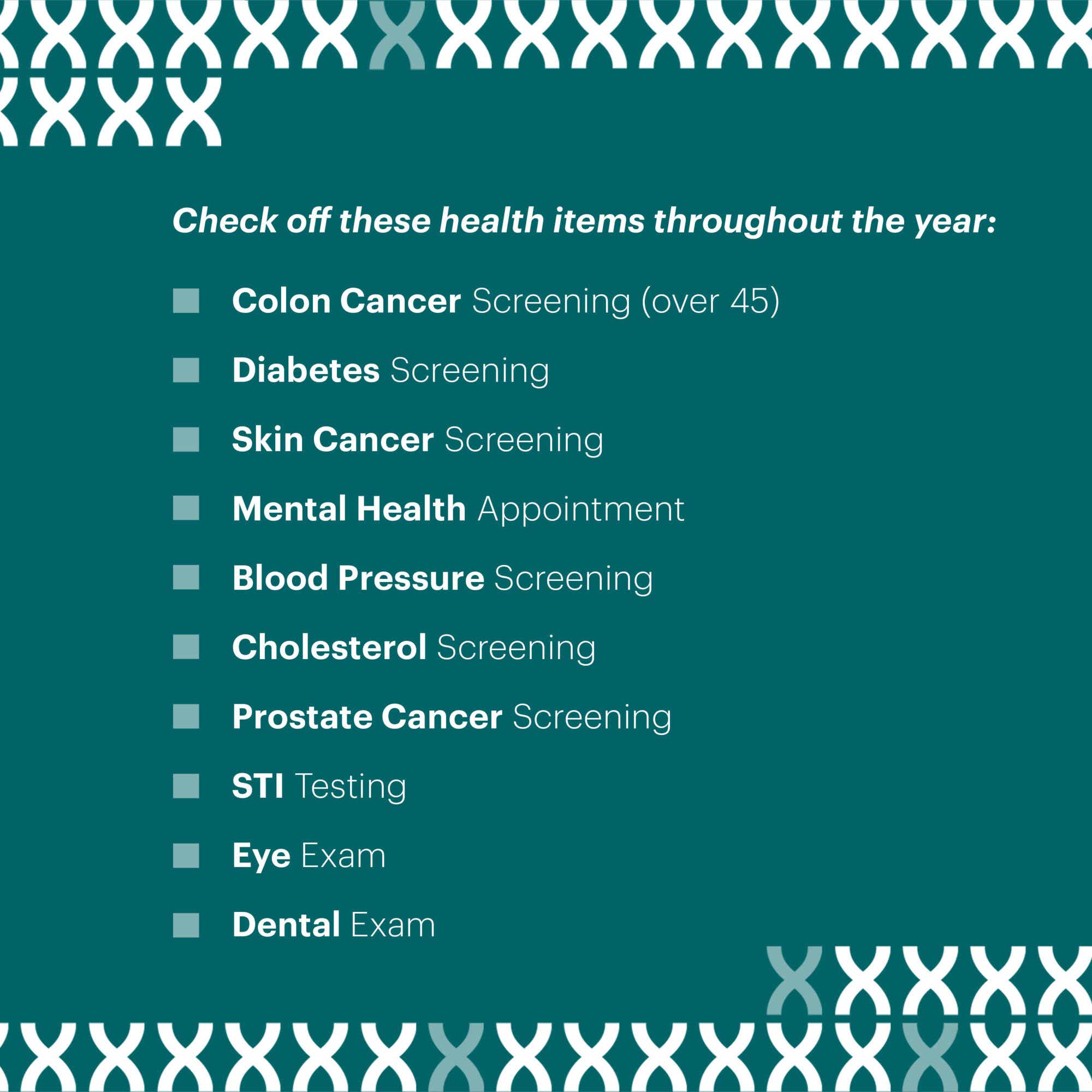There’s a lot of anecdotal evidence out there that men don’t go to the doctor enough, and as it turns out, there’s actually quite a bit of research to back those claims up. In the past year, almost half of men over 18 haven’t been to the doctor, and men are more likely than women to skip health screenings, ignore health recommendations from their primary care provider, and engage in riskier behaviors when it comes to their health.
Guys, even if you’re not ready to commit to positive lifestyle changes — like getting eight hours of sleep a night or flossing your teeth once a day — making regular visits to the doctor is one change that could literally save your life. If you’re worried that getting regular health screenings is inconvenient, with on-demand care options like telehealth and at-home colon cancer screening options like Cologuard, there’s no excuse not to take care of yourself. If you’re not sure what appointments you should make or how often you should see a physician, we’ve made this simple guide to help keep you on target and up-to-date on all of your regular screenings. You should be able to knock a lot of these screenings out with just a few quick appointments, so you might have time to get eight hours of sleep and daily flossing in after all.
When to start colon cancer screenings
Average risk men should begin regular colon cancer screenings after age 45. Take a minute right now to put an alert in your phone for the month before your 45th birthday to make an appointment. We promise it’ll be worth it.
These days, there are a number of options for colorectal cancer screenings, from Cologuard, which is an at-home test for average risk adults, to an in-person colonoscopy. If your Cologuard results are negative, you don’t have to get screened for another three years. If colonoscopy results are negative, you don’t need to get screened for another 10 years.
Regardless of your age, if you’re experiencing symptoms like bleeding, persistent pain, changes in bowel habits, or excessive weight loss, don’t hesitate to call your doctor.
How often to check your blood pressure
It’s likely that your doctor will check your blood pressure any time you’re at an appointment. That makes this screening an easy one, but also incredibly important, since heart disease is the leading cause of death for men.
If you don’t have any risk factors, the general guidance is that you should get your blood pressure checked every three years from age 18 to 40. If you’re over age 40, you should get checked once a year.
When to get your cholesterol checked
Cholesterol screening is part of a blood test called a lipid panel, which tests for “bad” cholesterol (LDL), “good” cholesterol (HDL), total cholesterol, and triglycerides. A high LDL level could lead to problems like a heart attack or stroke, and high triglyceride levels are also associated with heart issues.
Most healthy adults should have their cholesterol checked every five years or so starting at age 18, unless there's a family history of heart disease, in which case your doctor might suggest you get checked more often. Starting at age 45, men should start getting checked every one to two years, and once a year starting at age 65.
How to get a diabetes test
A diabetes test is a blood test that your doctor will administer to check glucose levels. There are different tests your doctor may run, but the most common is called an A1C test, which determines your average blood glucose levels over the past two to three months. Men should start getting tested at age 45. If you have a BMI above 25, talk to your doctor about whether you should be screened earlier.
If the results of this test are normal, you should get checked again in three years. If they’re not, your doctor will advise you on next steps.
When to screen for prostate cancer
This is a bit of a tricky one since there is no standard test to screen for prostate cancer (a rectal exam was once common practice but is no longer recommended). If you have a family history of prostate cancer or other risk factors, your doctor may recommend a blood test called a Prostate Specific Antigen test. There are pros and cons to getting a PSA test, so you and your doctor should discuss whether it’s right for you.
Which immunizations to get
Immunizations aren’t just for kids — in fact, some of the vaccines you received in childhood can wear off as you age. The CDC recommends that all adults get a Tdap booster shot, which protects against whooping cough, tetanus, and diphtheria, and then a Td booster shot every 10 years.
It’s also recommended that all adults get the flu shot each year, but this is even more important for older adults, whose immune systems may not fight off illness as easily. If you haven’t gotten a COVID-19 vaccine yet, it’s not too late, and they're now recommended for everyone age five or older. Talk to your doctor about getting vaccinated.
Boys should get an HPV vaccination at around age 11, but any man 26 or younger can get vaccinated. The HPV vaccine protects against genital warts and anal cancers in men, and can stop the spread of HPV, which can cause cervical cancer in women.
Healthy adults aged 50 or older should get a shingles vaccine, and adults 65 or older should get the pneumococcal polysaccharide vaccine (PPSV23), which protects against serious pneumococcal disease, including meningitis and bloodstream infections.
While this may sound like a lot, most of these vaccinations only need to be done once or once a decade, and the annual flu shot is offered at many local pharmacies to make it as convenient as possible.
How often to get a hearing test
Age-related hearing loss is extremely common for both men and women. In fact, one in four adults will experience hearing loss by age 65, and one in two by age 75. If you’re over 50, you should consider getting a hearing test every three years. If you’re already experiencing hearing loss, you should get tested annually, so your audiologist can prescribe or adjust hearing aids as necessary.
When to get an eye exam
This one is determined on a case-by-case basis. Adults who don’t have any vision problems should get checked about every five years until age 40. From 40 to 64, if you haven’t had any vision changes, you should get checked about every three years, and once you’re over 65 you should get your eyes checked annually.
When to get a skin cancer check
If you’re between the ages of 20 and 40, you should get checked for skin cancer every three years. If you’re over 40, you should get checked annually. Regardless of when you had your last exam, if you’ve got a freckle or mole that changes shape, color, or appearance, get it checked by a doctor.
How often you should get STI testing
The CDC recommends that all adults aged 13-64 be tested at least once for HIV, and annually depending on certain risk factors. CDC guidance on regular STI screenings for heterosexual men is vague, but if you’re showing any symptoms, go to your doctor. Most STIs can be cleared up with a simple round of antibiotics.
Should you get a mental health screening?
There's no specific CDC guidance on mental health screenings, but if you’re experiencing new or worsening mental health issues, they can be a great tool to help diagnose any issues or get you the right kind of help. If you think you could benefit from a mental health screening, your primary care physician should be able to recommend where to get one. We’ve also outlined tips for finding a therapist.
Note: Information provided is not clinical, diagnostic, or treatment advice. Ask your doctor about what screenings and screening options may be right for you.
Don't miss another screening — print out this checklist to make sure you're always up-to-date!










